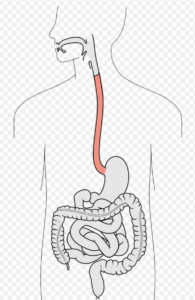
Ever get that heavy feeling in your chest after eating and wonder if the food is triggering a heart attack or if some heart problem is responding to your meal?
And the meal doesn’t necessarily have to be big or full of fat or grease in order to cause this heavy chest feeling.
“Most likely it’s because you have GERD (gastroesophageal reflux),” says Susan L. Besser, MD, with Mercy Medical Center, Baltimore, and Diplomate American Board of Obesity Medicine and board certified by the American Board of Family Medicine.
GERD and acid reflux are very common.
These conditions may be chronic or episodic, and triggers in addition to eating include anxiety and sleeping in a horizontal position.
Eating and a Heavy Feeling in the Chest
Dr. Besser explains, “In this condition, stomach contents regurgitate into the esophagus, which is located in the chest.
“This regurgitated food irritates the esophagus, and that can cause pain or heaviness in the chest.”

Olek Remesz,wiki-pl,Orem, commons
The esophagus is a muscle — but not the same kind of muscle that you flex in your arms.
Heaviness in Chest After Eating May Also Be Caused by Heart Disease
“Of course, heaviness in the chest also happens with heart disease (in this case it is called angina),” says Dr. Besser.
“It can happen after eating a big meal because the body (and heart) are working harder to digest the meal. This can put some strain on the heart.”
So just when you thought you were in the clear, you now fear you might have heart disease.
Risk Factors for Heart Disease Include:
• Sedentary lifestyle heavy feeling in chest
• Standard American diet
• Poor sleep/insomnia gerd
• Untreated sleep apnea
• Poor stress management
• Excess abdominal fat
• Obesity acid reflex
• High blood pressure acid reflux
• Diabetes
• Smoking
• Age 45+ for men, 50+ for women
• Family history
If you’re worried about heart disease, then get a full workup by a cardiologist including an echocardiogram stress test which will measure blood flow through your heart during exertion on a treadmill.
You may even want to consider having your calcium score taken if you’re at least 45.
 Dr. Besser provides comprehensive family care, treating common and acute primary conditions like diabetes and hypertension. Her ongoing approach allows her the opportunity to provide accurate and critical diagnoses of more complex conditions and disorders.
Dr. Besser provides comprehensive family care, treating common and acute primary conditions like diabetes and hypertension. Her ongoing approach allows her the opportunity to provide accurate and critical diagnoses of more complex conditions and disorders.
 Lorra Garrick has been covering medical, fitness and cybersecurity topics for many years, having written thousands of articles for print magazines and websites, including as a ghostwriter. She’s also a former ACE-certified personal trainer.
Lorra Garrick has been covering medical, fitness and cybersecurity topics for many years, having written thousands of articles for print magazines and websites, including as a ghostwriter. She’s also a former ACE-certified personal trainer.
.











